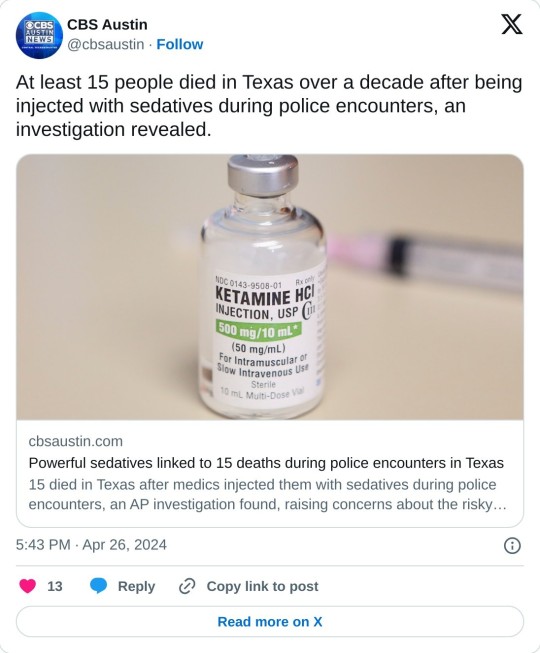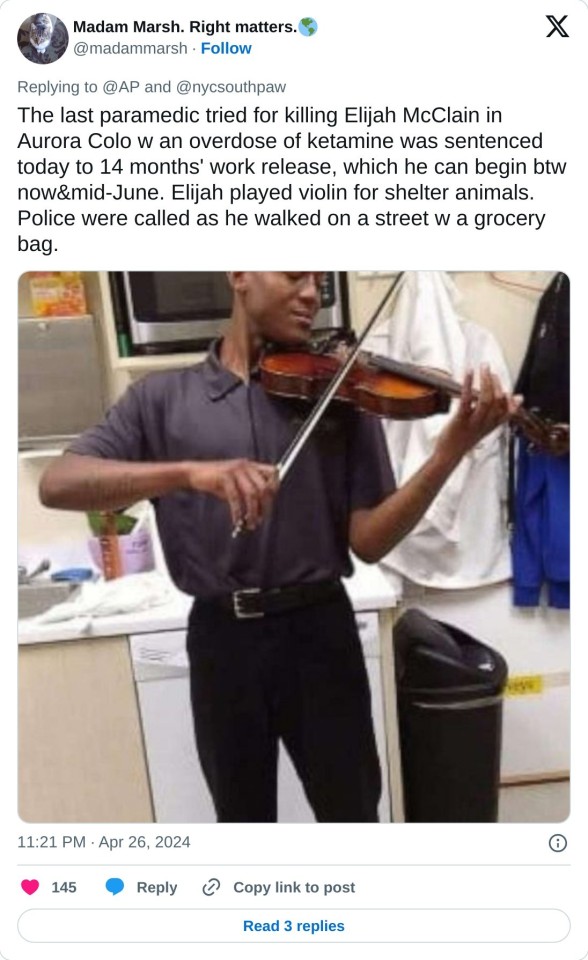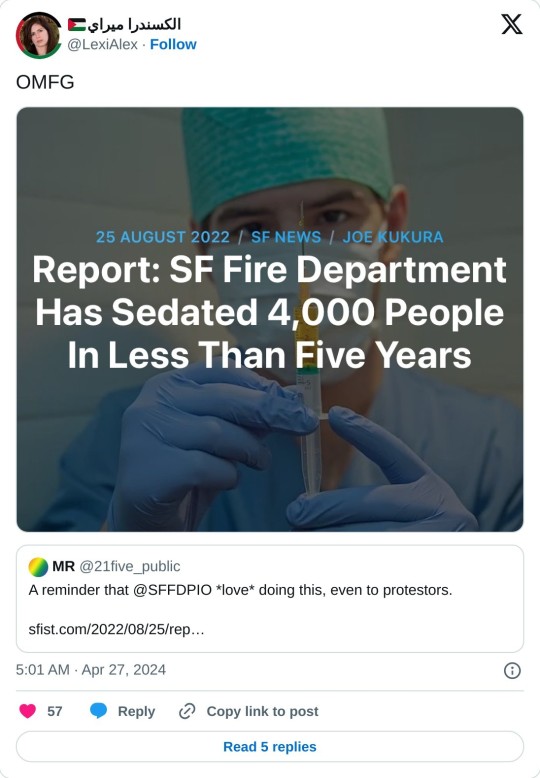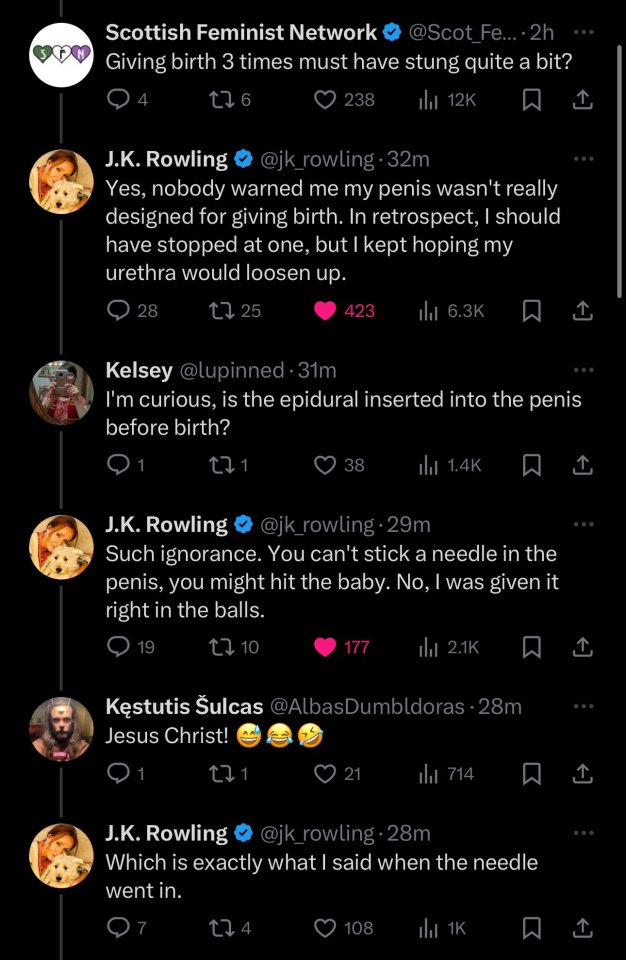Text
🇺🇸🇵🇸🚨
COLOMBIA UNIVERSITY VIOLENTLY STORMED AND SHUT DOWN BY NYPD
📹 Scenes from the violent dispersal of Colombia University protests after police stormed "Hind Hall", named by students in memory of 6-year-old Hind Rajab who was killed by the Israeli occupation forces along with two paramedics in the Gaza Strip.
Protesters are violently assaulted and arrested by NYPD, among the most notoriously violent police in the country.
News reports meanwhile claim no tear gas was used in the raid, and say no one was injured in the assaults, video evidence to the contrary.
#source
#videosource
@WorkerSolidarityNews
288 notes
·
View notes
Photo
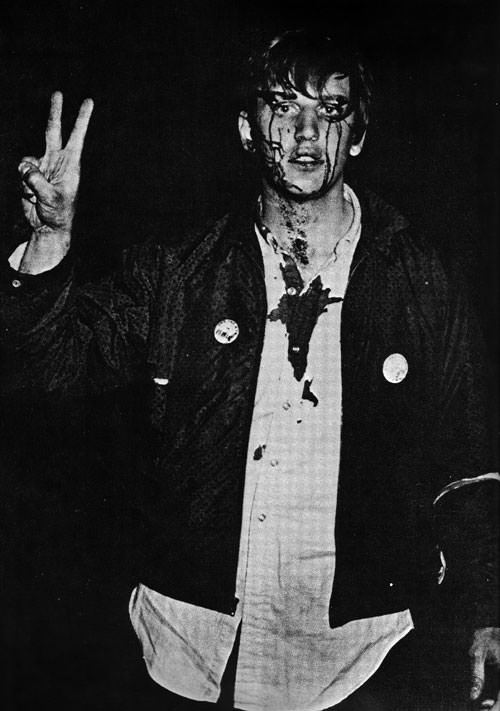
Columbia student flashes the peace sign after being beaten by riot police at an antiwar demonstration, April 1968
via reddit
12K notes
·
View notes
Text

Secret yin Yang in my taiwanese iron goddess of mercy oolong + Ikuyo matcha tea latte
47 notes
·
View notes
Text
has anybody seen my pet piece of paper. his name is walter he is very fragile but very adventurous. i should never have left the window open in my tenth story apartment
47K notes
·
View notes
Text
just saw a single piece of paper drift past 50 feet in the air over buildings like a beautiful white bird
35K notes
·
View notes
Text
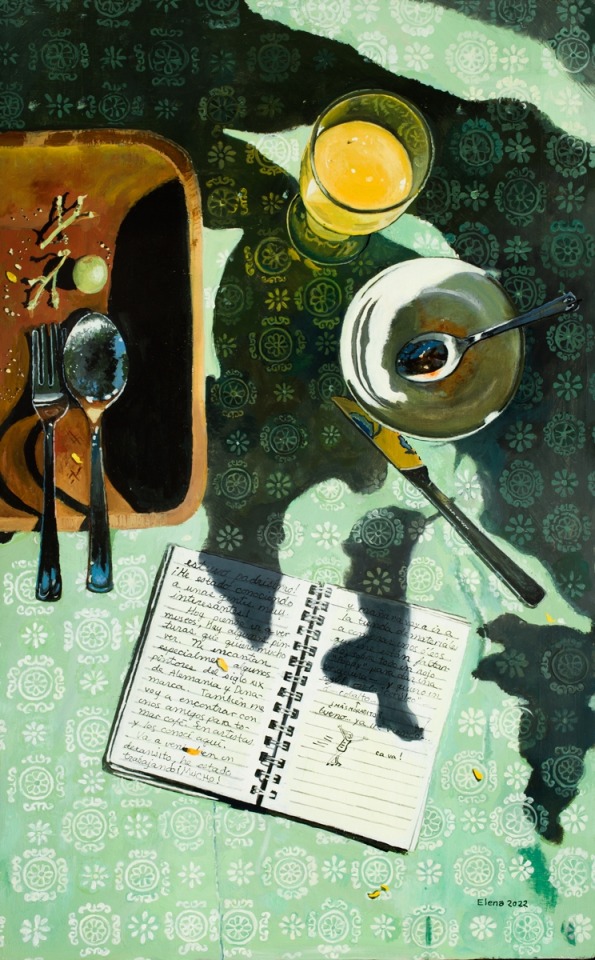
Outdoors Breakfast - Elena Climent , 2022.
Mexican, b. 1955-
Oil on linen on bord, 17 3/4 x 11 in.
6K notes
·
View notes
Text




Messages of support and strength from Rafah, Palestine to the US student movement.
20K notes
·
View notes
Photo

im convinced that the window looks like a monet painting
782K notes
·
View notes
Text
i recently stopped working in abortion care (i want to write about that decision, but not right now) but i was going through my old drafts and i wanted to expand on this:
something i’ve been thinking about a lot, especially in relation to my job, is the relationship between women’s quality of life, feminist consciousness raising, practical feminist action, and the language used to describe male violence (and the culture of, etc) that can sometimes revictimize and alienate women who have experienced it. by this i mean: when i have a patient who discloses to me that her unwanted pregnancy is the result of her partner slipping off the condom, does it actually improve her quality of life or increase her safety if i insist that we call her experience rape by deception or assault? would she perhaps be better served if i choose to mirror the language she uses to describe it, even if i disagree with how she wants to name that experience?
in my experience working with women who are often subjected to what i might term “casual” sexual violence (things that are often perceived as innocuous or common by many women, like condom tampering or emotional manipulation to receive sex), many of those women feel resistant or even defensive when other people call those experiences rape, or assault, or even harm.
in my experience, many women will acknowledge how their experiences affect them personally (how it made them feel, what it cost them, how it has made them view their partner) but they will not politicize their experience by naming it as and contextualizing it within a culture of male violence. this is perhaps not a feminist approach. however, in my experience, most women will do whatever they can— including creating linguistic loopholes through which they can obfuscate the reality of male violence in their lives— to survive their experiences in the moment. women will sometimes lie to themselves and others in order to keep living. while it is perhaps not the most sustainable survival tactic, i think that feminists should be cautious of dismissing this approach as strictly anti-feminist and solely patriarchy-serving. women have an incredible talent for prioritizing their own survival through the trauma at hand (the traumas that often follow as consequences of male violence: having an abortion, needing housing assistance, filing for divorce, seeking mutual aid, navigating healthcare as an abused woman). just because that ability to survive and cope sometimes comes at the cost of the recognition of the role that patriarchy (and its iterations, such as male violence) plays in their circumstances does not entirely negate the net benefit to women’s lives of being able to continue functioning in day-to-day life, being able to make clear-headed decisions about the impacts that materially affect them in the aftermath of patriarchy (can i actually stay pregnant? do i want to?), and, in some cases, moving through life without the psychological experience of having been victimized.
i think that as feminists, especially when we work directly with women impacted by patriarchy in real and painful ways, in the aftermath of that impact, there is an impulse to lead the horse to water and make it drink. there is an impulse to make the woman acknowledge that this isn’t her fault by pushing her to name male violence. there is an impulse to lead by example, to name it for her. i have certainly felt this impulse in abortion care. when a woman begins to cry, explaining that her partner knows she cannot get pregnant because of a life-threatening medical condition yet refused to wear a condom because it doesn’t “feel as good” for him, my own anger at her situation spurs that impulse. yet my experience has shown me part of effectively aiding women in crisis is prioritizing her own feelings, emotions and outlook over my own. that is, in my opinion, a radically feminist act, and one that is perhaps the most effective when consciousness-raising.
when i told women like that, “That’s horrible! He assaulted you and put your life in danger!” I was, effectively, ending the conversation. I was closing dialogue by imposing my interpretation of her circumstances over her. now the woman may regret sharing her story with me, she may feel pressured to hide her situation in the future, she may feel pressured to defend her partner, or she may begin to recognize her own cognitive dissonance about her situation at a time when she is not mentally prepared to face it. my prioritization of my own beliefs about her experiences may, ultimately, make the experience of having her abortion a lifelong trauma because i have forced her to reckon with her experience of male sexual violence, my own judgement of her relationship at a time when she chose to be vulnerable, and the experience of having the abortion all at the same time.
by contrast, when i began telling women like that, “I’m really interested in how that’s impacted you. How do you feel at home with him? Have you been considering birth control because of this? How are you feeling about the decision you’re faced with because of your partner’s actions?” I am opening the dialogue by demonstrating my interest in her thoughts and feelings about her experience. when i was careful to mirror the other woman’s language about her experience, i was often able to collaborate with the woman to find her helpful and harm-reductive solutions to improve her quality of life. sometimes, that meant getting her a birth control method that her partner couldn’t detect. sometimes, that meant sending her home with a supply of Plan B. sometimes, that meant connecting her with a social worker and creating a plan to safely exit her relationship. sometimes, it meant sending her to a prenatal specialist because she wanted the pregnancy regardless of the risk. this approach is very hard— it’s frustrating, it’s infuriating, it’s suffocating. it’s not satisfying or cathartic. it’s especially difficult to take this approach when working with very young women and girls, when working with those who are not health literate, when working with those who are religious or socially conservative.
but that is the real, on the ground, hands in the mud feminist work. it requires me to acknowledge that i do not know better. my deep knowledge of feminist literature and my own personal convictions about patriarchy and feminism do not mean that i can teach a woman anything about her own life. i have to acknowledge that i don’t know better even when i do literally, objectively know better. part of doing feminist work with the general female populace is acknowledging that while my feminist framework can shape the way i approach women’s issues, i will never connect to women, gain their trust, build a relationship, or meaningfully support them while telling them how they should think and act in their lives. this framework is mostly useful for those engaging in real-life work with women but i encourage those of use engaging with random women online to also use this framework. for anyone interested in learning more about this approach to feminist work, i would strongly recommend “Decision Assessment and Counseling in Abortion Care” by Alissa Perrucci.
584 notes
·
View notes
Text
In World War II, Nazi Germany established brothels in the concentration camps (Lagerbordell, Sonderbauten or Freudenabteilungen "Joy Divisions") to increase productivity among male inmates.
In the end, the camp brothels did not produce any noticeable increase in the prisoners' productivity levels, but instead, created a market for coupons among the camp VIPs.
Here's a few of the locations where this happened:
Mauthausen/Gusen, Auschwitz, Buchenwald, Neuengamme, Dachau, Dora-Mittelbau, Sachsenhausen, Flossenbürg and others
The women forced into these brothels came mainly from the women-only Ravensbrück concentration camp, except for Auschwitz, which "employed" its own prisoners.
In combination with the German military brothels in World War II, it is estimated that at least 34,140 female inmates were forced into sexual slavery during the Third Reich.
The brothels form the subject of "Das KZ Bordell" (The Concentration Camp Brothel) by Robert Sommer, a book that has been hailed as the first comprehensive account of a little known chapter of Nazi oppression in World War Two.
It explores the origins, structure and impact of the "Sonderbauten" (special buildings) run by Heinrich Himmler's SS in Germany and Nazi-occupied Europe.
"In the collective memory and written history of World War Two, the camp brothels were for a long time taboo," the 35-year-old Berliner told Reuters. "The former prisoners didn't want to talk about it: it was a difficult subject to handle."
"It didn't fit so easily into the postwar image of the concentration camps as monuments to suffering."
According to concentration camp survivors the women in those brothels were replaced every 6 months and the women who got replaced were killed in gas chambers.
It is important to note that we distinctively speak of sexual slavery here and of rape.
I wanted to point this out especially because I have been seeing liberal feminists talking about this topic, calling it "forced sex-work", "forced sex-labour" etc.
It is beyond disrespectful to call these female victims "sex-workers" or "employees" when their sexuality was brutally exploited, their diginities taken, their health was sacrificed, they were raped repeatedly and then executed after 6 months, even though they were promised to be released after those months. But those promises of course were never honored.
Liberal feminism and radical feminism differs a lot when it comes to views on the topic of prostitution but this does NOT excuse labeling victims of abuse and rape as "sex-workers" or calling their suffering "forced sex-labour."
639 notes
·
View notes
Text
In World War II, Nazi Germany established brothels in the concentration camps (Lagerbordell, Sonderbauten or Freudenabteilungen "Joy Divisions") to increase productivity among male inmates.
In the end, the camp brothels did not produce any noticeable increase in the prisoners' productivity levels, but instead, created a market for coupons among the camp VIPs.
Here's a few of the locations where this happened:
Mauthausen/Gusen, Auschwitz, Buchenwald, Neuengamme, Dachau, Dora-Mittelbau, Sachsenhausen, Flossenbürg and others
The women forced into these brothels came mainly from the women-only Ravensbrück concentration camp, except for Auschwitz, which "employed" its own prisoners.
In combination with the German military brothels in World War II, it is estimated that at least 34,140 female inmates were forced into sexual slavery during the Third Reich.
The brothels form the subject of "Das KZ Bordell" (The Concentration Camp Brothel) by Robert Sommer, a book that has been hailed as the first comprehensive account of a little known chapter of Nazi oppression in World War Two.
It explores the origins, structure and impact of the "Sonderbauten" (special buildings) run by Heinrich Himmler's SS in Germany and Nazi-occupied Europe.
"In the collective memory and written history of World War Two, the camp brothels were for a long time taboo," the 35-year-old Berliner told Reuters. "The former prisoners didn't want to talk about it: it was a difficult subject to handle."
"It didn't fit so easily into the postwar image of the concentration camps as monuments to suffering."
According to concentration camp survivors the women in those brothels were replaced every 6 months and the women who got replaced were killed in gas chambers.
It is important to note that we distinctively speak of sexual slavery here and of rape.
I wanted to point this out especially because I have been seeing liberal feminists talking about this topic, calling it "forced sex-work", "forced sex-labour" etc.
It is beyond disrespectful to call these female victims "sex-workers" or "employees" when their sexuality was brutally exploited, their diginities taken, their health was sacrificed, they were raped repeatedly and then executed after 6 months, even though they were promised to be released after those months. But those promises of course were never honored.
Liberal feminism and radical feminism differs a lot when it comes to views on the topic of prostitution but this does NOT excuse labeling victims of abuse and rape as "sex-workers" or calling their suffering "forced sex-labour."
639 notes
·
View notes
Text
legitimately so scary that i just made a doctors appointment for 2025. you mean the far distant sci fi future 2025? you mean the pacific rim 2025? you mean i have to go to the doctor while giant robots are fighting the fucking kaiju? fuck all the way offfffffff
52K notes
·
View notes
Text
hey man I found a piece of your soul stuck in the text messages of old friends you don’t speak to anymore. do you want it back
23K notes
·
View notes
Text
I have a friend who dislikes her children.
That’s probably unfair, I’m sure she loves them very much, but there is real resentment there. Whether or not she wanted to be a mother is unclear, but her unhappiness sure is. Children are difficult, and if you’re not 100% prepared and enthusiastic about that it is going to be a terrible time for you.
I don’t think she is a bad person. She is frequently overwhelmed by both her family and the stream of idealized social media that makes it sound like everyone else is having a ball. So she goes on Facebook to talk about how miserable she is, how she misses her old life that all her friends seem to still have. It’s probably the only thing keeping her sane, along with her husband who actually loves kids.
This isn’t to shame anyone, but seeing her posts really cements in my mind how I would probably be in the same boat, and how glad I am that I made the decision not to put myself in this position. I would never want to bring another human into this world with the knowledge that they might make me miserable, and that I would likely make them miserable in turn, whether or not I meant to. No innocent child deserves that.
So many people still cling to a mythologized Feminine Instinct that states my uterus gives me more empathy, gives me more patience, gives me a duty that I can’t reject. They say that choosing to be childless is more selfish than having a child that you are unable to care for, that you will dislike. If those people saw the pain of those unsuited for motherhood I hope they would change their minds, but they never will.
2K notes
·
View notes

